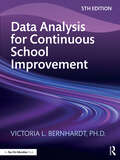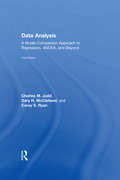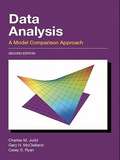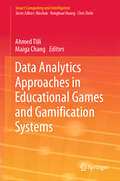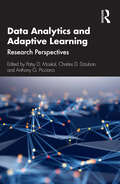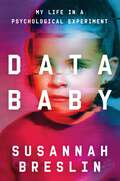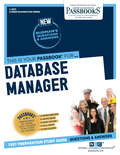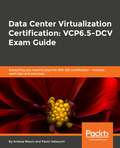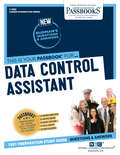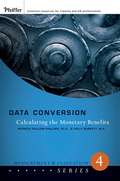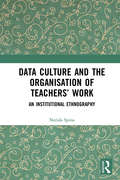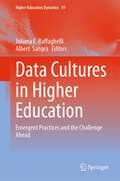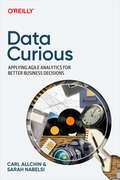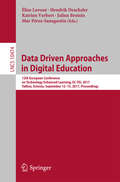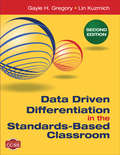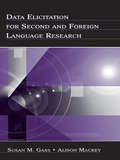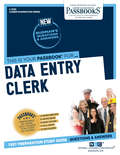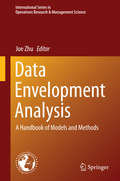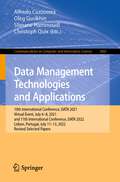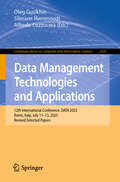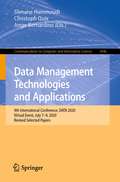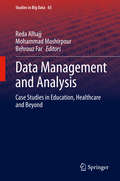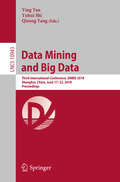- Table View
- List View
Data Analysis for Continuous School Improvement
by Victoria L. BernhardtWith the 5th Edition of Data Analysis for Continuous School Improvement, best-selling Victoria Bernhardt has written the go-to-resource for data analysis in your school! By incorporating collaborative structures to implement, monitor, and evaluate the vision and continuous improvement plan, this book provides a framework to show learning organizations how to create the results they really want for all teachers and all students. A culmination of over 30 years of doing the hard work in schools and districts both nationally and internationally, this 5th Edition shares new, evidence-based information and shows how to analyze, report, communicate, and use multiple measures of data, to create a shared vision and a continuous school improvement plan that gets implemented – a plan that doesn't just gather dust on an office shelf. The revised edition is updated throughout including new chapters on school processes, student achievement, and evaluation. As always, Dr. Bernhardt provides a wealth of tools, protocols, timelines, examples, and strategies that will help schools and districts become genuine learning organizations.
Data Analysis: A Model Comparison Approach To Regression, ANOVA, and Beyond, Third Edition
by Charles M. Judd Carey S. Ryan Gary H. McClellandData Analysis: A Model Comparison Approach to Regression, ANOVA, and Beyond is an integrated treatment of data analysis for the social and behavioral sciences. It covers all of the statistical models normally used in such analyses, such as multiple regression and analysis of variance, but it does so in an integrated manner that relies on the comparison of models of data estimated under the rubric of the general linear model. Data Analysis also describes how the model comparison approach and uniform framework can be applied to models that include product predictors (i.e., interactions and nonlinear effects) and to observations that are nonindependent. Indeed, the analysis of nonindependent observations is treated in some detail, including models of nonindependent data with continuously varying predictors as well as standard repeated measures analysis of variance. This approach also provides an integrated introduction to multilevel or hierarchical linear models and logistic regression. Finally, Data Analysis provides guidance for the treatment of outliers and other problematic aspects of data analysis. It is intended for advanced undergraduate and graduate level courses in data analysis and offers an integrated approach that is very accessible and easy to teach. Highlights of the third edition include: a new chapter on logistic regression; expanded treatment of mixed models for data with multiple random factors; updated examples; an enhanced website with PowerPoint presentations and other tools that demonstrate the concepts in the book; exercises for each chapter that highlight research findings from the literature; data sets, R code, and SAS output for all analyses; additional examples and problem sets; and test questions.
Data Analysis: A Model Comparison Approach, Second Edition
by Charles M. Judd Carey S. Ryan Gary H. McclellandThis completely rewritten classic text features many new examples, insights and topics including mediational, categorical, and multilevel models. Substantially reorganized, this edition provides a briefer, more streamlined examination of data analysis. Noted for its model-comparison approach and unified framework based on the general linear model, the book provides readers with a greater understanding of a variety of statistical procedures. This consistent framework, including consistent vocabulary and notation, is used throughout to develop fewer but more powerful model building techniques. The authors show how all analysis of variance and multiple regression can be accomplished within this framework. The model-comparison approach provides several benefits: It strengthens the intuitive understanding of the material thereby increasing the ability to successfully analyze data in the future It provides more control in the analysis of data so that readers can apply the techniques to a broader spectrum of questions It reduces the number of statistical techniques that must be memorized It teaches readers how to become data analysts instead of statisticians. The book opens with an overview of data analysis. All the necessary concepts for statistical inference used throughout the book are introduced in Chapters 2 through 4. The remainder of the book builds on these models. Chapters 5 - 7 focus on regression analysis, followed by analysis of variance (ANOVA), mediational analyses, non-independent or correlated errors, including multilevel modeling, and outliers and error violations. The book is appreciated by all for its detailed treatment of ANOVA, multiple regression, nonindependent observations, interactive and nonlinear models of data, and its guidance for treating outliers and other problematic aspects of data analysis. Intended for advanced undergraduate or graduate courses on data analysis, statistics, and/or quantitative methods taught in psychology, education, or other behavioral and social science departments, this book also appeals to researchers who analyze data. A protected website featuring additional examples and problems with data sets, lecture notes, PowerPoint presentations, and class-tested exam questions is available to adopters. This material uses SAS but can easily be adapted to other programs. A working knowledge of basic algebra and any multiple regression program is assumed.
Data Analytics Approaches in Educational Games and Gamification Systems (Smart Computing and Intelligence)
by Maiga Chang Ahmed TliliGame-based learning environments and learning analytics are attracting increasing attention from researchers and educators, since they both can enhance learning outcomes. This book focuses on the application of data analytics approaches and research on human behaviour analysis in game-based learning environments, namely educational games and gamification systems, to provide smart learning. Specifically, it discusses the purposes, advantages and limitations of applying such approaches in these environments. Additionally, the various smart game-based learning environments presented help readers integrate learning analytics in their educational games and gamification systems to, for instance, assess and model students (e.g. their computational thinking) or enhance the learning process for better outcomes. Moreover, the book presents general guidelines on various aspects, such as collecting data for analysis, game-based learning environment design, system architecture and applied algorithms, which facilitate incorporating learning analytics into educational games and gamification systems.After a general introduction to help readers become familiar with the subject area, the individual chapters each discuss a different aim of applying data analytics approaches in educational games and gamification systems. Lastly, the conclusion provides a summary and presents general guidelines and frameworks to consider when designing smart game-based learning environments with learning analytics.
Data Analytics and Adaptive Learning: Research Perspectives
by Patsy D. Moskal, Charles D. Dziuban, and Anthony G. PiccianoData Analytics and Adaptive Learning offers new insights into the use of emerging data analysis and adaptive techniques in multiple learning settings. In recent years, both analytics and adaptive learning have helped educators become more responsive to learners in virtual, blended, and personalized environments. This set of rich, illuminating, international studies spans quantitative, qualitative, and mixed-methods research in higher education, K–12, and adult/continuing education contexts. By exploring the issues of definition and pedagogical practice that permeate teaching and learning and concluding with recommendations for the future research and practice necessary to support educators at all levels, this book will prepare researchers, developers, and graduate students of instructional technology to produce evidence for the benefits and challenges of data-driven learning.
Data Baby: My Life in a Psychological Experiment
by Susannah BreslinA Belletrist Book Pick for December 2023Lab Girl meets Brain on Fire in this provocative and poignant memoir delving into a woman's formative experiences as a veritable "lab rat" in a lifelong psychological study, and her pursuit to reclaim autonomy and her identity as a adult. What if your parents turn you into a human lab rat when you&’re a child? Will that change the story of your life? Will that change who you are? When Susannah Breslin is a toddler, her parents enroll her in an exclusive laboratory preschool at the University of California, Berkeley, where she becomes one of over a hundred children who are research subjects in an unprecedented thirty-year study of personality development that predicts who she and her cohort will grow up to be. Decades later, trapped in what she feels is an abusive marriage and battling breast cancer, she starts to wonder how growing up under a microscope shaped her identity and life choices. Already a successful journalist, she makes her own curious history the subject of her next investigation. From experiment rooms with one-way mirrors, to children&’s puzzles with no solutions, to condemned basement laboratories, her life-changing journey uncovers the long-buried secrets hidden behind the renowned study. The question at the gnarled heart of her quest: Did the study know her better than she knew herself? At once bravely honest and sharply witty, Data Baby is a compelling and provocative account of a woman&’s quest to find her true self, and an unblinking exploration of why we turn out as we do. Few people in all of history have been studied from such a young age and for as long as this author, but the message of her book is universal. In an era when so many of us are looking to technology to tell us who to be, it&’s up to us to discover who we actually are.
Data Base Manager: Passbooks Study Guide (Career Examination Series)
by National Learning CorporationThe Data Base Manager Passbook® prepares you for your test by allowing you to take practice exams in the subjects you need to study. It provides hundreds of questions and answers in the areas that will likely be covered on your upcoming exam, including but not limited to: programming techniques and concepts, including the use of pseudo language; project Management; principles and practices of data base administration; principles of databases for microcomputers; and more.
Data Center Virtualization Certification: Everything you need to achieve 2V0-622 certification – with exam tips and exercises
by Andrea Mauro Paolo ValsecchiDeploy and configure vSphere infrastructure and learn to effectively create and administer vSphere virtual machinesKey FeaturesImplement advanced network virtualization techniquesConfigure and administer vSphere high availabilityEnhance your data center virtualization skills with practice questions and mock testsBook DescriptionThis exam guide enables you to install, configure, and manage the vSphere 6.5 infrastructure in all its components: vCenter Server, ESXi hosts, and virtual machines, while helping you to prepare for the industry standard certification.This data center book will assist you in automating administration tasks and enhancing your environment’s capabilities. You will begin with an introduction to all aspects related to security, networking, and storage in vSphere 6.5. Next, you will learn about resource management and understand how to back up and restore the vSphere 6.5 infrastructure. As you advance, you will also cover troubleshooting, deployment, availability, and virtual machine management. This is followed by two mock tests that will test your knowledge and challenge your understanding of all the topics included in the exam.By the end of this book, you will not only have learned about virtualization and its techniques, but you’ll also be prepared to pass the VCP6.5-DCV (2V0-622) exam.What you will learnDeploy and configure vSphere infrastructureCreate and administer vSphere virtual machinesOptimize, secure, and troubleshoot all vSphere componentsImplement vSphere HA on a vSAN clusterUnderstand how to back up and restore your vSphere 6.5 infrastructureTest your understanding of key concepts required through sample questionsWho this book is forIf you are interested in achieving Data Center Virtualization certification, this is the book is for you. You will also benefit from this book if you are a system administrator or network engineer. Some prior knowledge of virtualization can assist you in understanding key concepts covered in the book.
Data Collection: Planning for and Collecting All Types of Data
by Patricia Pulliam Phillips Cathy A. StawarskiData Collection Data Collection is the second of six books in the Measurement and Evaluation Series from Pfeiffer. The proven ROI Methodology--developed by the ROI Institute--provides a practical system for evaluation planning, data collection, data analysis, and reporting. All six books in the series offer the latest tools, most current research, and practical advice for measuring ROI in a variety of settings. Data Collection offers an effective process for collecting data that is essential to the implementation of the ROI Methodology. The authors outline the techniques, processes, and critical issues involved in successful data collection. The book examines the various methods of data collection, including questionnaires, interviews, focus groups, observation, action plans, performance contracts, and monitoring records. Written for evaluators, facilitators, analysts, designers, coordinators, and managers, Data Collection is a valuable guide for collecting data that are adequate in quantity and quality to produce a complete and credible analysis.
Data Control Assistant: Passbooks Study Guide (Career Examination Series)
by National Learning CorporationThe Data Control Assistant Passbook® prepares you for your test by allowing you to take practice exams in the subjects you need to study. It provides hundreds of questions and answers in the areas that will likely be covered on your upcoming exam, including but not limited to: Coding/Decoding information; Logical reasoning using flow charts; Office record keeping; Understanding and interpreting a manual; and more.
Data Conversion: Calculating the Monetary Benefits
by Patricia Pulliam Phillips Holly BurkettThis book tackles the third major challenge and the second most difficult step in the ROI methodology: converting data to monetary values. When a particular project or program is connected to a business measure, the next logical question is: what is the monetary value of that impact? For ROI analysis, it is at this critical point where the monetary benefits are developed to compare to the costs of the program to calculate the ROI. Includes: the importance of converting data to monetary value; preliminary issues; standard values: the standard values: where to find them; using internal experts, using external databases; linking with other measures; using estimates; when to abandon conversion efforts and leave data as intangible, analyzing the intangibles; and reporting the intangibles.
Data Culture and the Organisation of Teachers’ Work: An Institutional Ethnography
by Nerida SpinaData Culture and the Organisation of Teachers’ Work provides an in-depth look at how the political and media scrutiny of teachers, pupils and schools now organises teaching and learning. Spina also examines how educational data is used in schools, and where it fails to take account of the everyday experiences of school leaders, teachers and students. Drawing on primary research, and discussing practice in relation to the National Assessment Programme: Literacy and Numeracy (NAPLAN), this book discusses the strengths and weaknesses of a data-driven approach, the restrictions this can impose and how to navigate them as a teacher. Ideal for scholars and postgraduate students of education, this book provides a comprehensive institutional, ethnographic look into the daily lived experiences of teachers, and the effects of standardised testing.
Data Cultures in Higher Education: Emergent Practices and the Challenge Ahead (Higher Education Dynamics #59)
by Juliana E. Raffaghelli Albert SangràThis collection focuses on the role of higher education institutions concerning datafication as a complex phenomenon. It explores how the universities can develop data literac(ies) shaping tomorrow skills and “formae mentis” to face the most deleterious effects of datafication, but also to engage in creative and constructive ways with data. Notably, the book spots data practices within the two most relevant sides of academics’ professional practice, namely, research and teaching. Hence, the collection seeks to reflect on faculty’s professional learning about data infrastructures and practices.The book draws on a range of studies covering the higher education response to the several facets of data in society, from data surveillance and the algorithmic control of human behaviour to empowerment through the use of open data. The research reported ranges from literature overviews to multi-case and in-depth case studies illustrating institutional and educational responses to different problems connected to data. The ultimate intention is to provide conceptual bases and practical examples relating to universities’ faculty development policies to overcome data practices and discourses' fragmentation and contradictions: in a nutshell, to build “fair data cultures” in higher education.
Data Curious: Applying Agile Analytics for Better Business Decisions
by Carl Allchin Sarah NabelsiData has been a missing part of most academic curriculums for a long time, and we're all being affected. During challenging times, creating a data-informed culture can help you pivot quickly or prevent expensive missteps. Developing a data curious organization will take advantage of the burgeoning data resources available as a result of increasing digitalization.With this book, authors Carl Allchin and Sarah Nabelsi show today's business professionals how to become data empowered. These tech-savvy business professionals will learn data literacy fundamentals—from understanding the possibilities to asking the right questions. You'll discover how to make the right technology choices and avoid pitfalls that could put your career and company at risk.Discover what an agile, empowered, data-driven organization should look likeExamine how to use data in new ways to help your business come to lifeLearn key terms and concepts around data management and analyticsUnderstand the differences between spreadsheet analysis and a data analytics pipelineGet advice for working with data scientists and explore ways to mitigate the IT department's concerns
Data Driven Approaches in Digital Education: 12th European Conference on Technology Enhanced Learning, EC-TEL 2017, Tallinn, Estonia, September 12–15, 2017, Proceedings (Lecture Notes in Computer Science #10474)
by Katrien Verbert Hendrik Drachsler Élise Lavoué Mar Pérez-Sanagustín Julien BroisinThis book constitutes the proceedings of the 12th European Conference on Technology Enhanced Learning, EC-TEL 2017, held in Tallinn, Estonia, in September 2017. The 24 full papers, 23 short papers, 6 demo papers, and 22 poster papers presented in this volume were carefully reviewed and selected from 141 submissions. The theme for the 12th EC-TEL conference on Data Driven Approaches in Digital Education' aims to explore the multidisciplinary approaches that eectively illustrate how data-driven education combined with digital education systems can look like and what are the empirical evidences for the use of datadriven tools in educational practices.
Data Driven Differentiation in the Standards-Based Classroom
by Gayle H. Gregory Linda M. KuzmichCollect the data you need to reach every student! When it comes to meeting the rigorous new standards of the Common Core Curriculum, knowing how to collect, analyze, and use data makes all the difference. Fully updated to support the Common Core and other key standards, this informative book shares an author with the best-selling Differentiated Instructional Strategies: One Size Doesn’t Fit All. Veteran educators Gregory and Kuzmich provide user-friendly techniques for gathering qualitative and quantitative information, helping you tailor instruction and assessment for diverse learners. This resource is ideal for classroom teachers, curriculum developers, instructional leaders, and district administrators. Readers will find: Step-by-step guidance on gathering data to improve classroom dynamics, pinpoint student learning styles, adjust lessons for different learners, and inform diagnostic teaching and assessment Techniques for using data to enhance curriculum, including numerous unit and lesson plans fully linked to the Common Core A wealth of templates for fast and simple data collection Updated differentiation strategies for the Common Core and other key standards, including the Career and College Readiness Standards and the Standards of Mathematical Practice Collect data with ease and discover new tools for differentiated teaching and learning! Praise for the First Edition: "This book reconciles meeting children’s affective needs with the new accountability requirements from the federal and state government. The title may sound daunting, but the chapters are extremely accessible." —Maria Elena Reyes, Associate Professor University of Alaska Fairbanks
Data Driven Differentiation in the Standards-Based Classroom
by Gayle H. Gregory Linda M. KuzmichCollect the data you need to reach every student! When it comes to meeting the rigorous new standards of the Common Core Curriculum, knowing how to collect, analyze, and use data makes all the difference. Fully updated to support the Common Core and other key standards, this informative book shares an author with the best-selling Differentiated Instructional Strategies: One Size Doesn’t Fit All. Veteran educators Gregory and Kuzmich provide user-friendly techniques for gathering qualitative and quantitative information, helping you tailor instruction and assessment for diverse learners. This resource is ideal for classroom teachers, curriculum developers, instructional leaders, and district administrators. Readers will find: Step-by-step guidance on gathering data to improve classroom dynamics, pinpoint student learning styles, adjust lessons for different learners, and inform diagnostic teaching and assessment Techniques for using data to enhance curriculum, including numerous unit and lesson plans fully linked to the Common Core A wealth of templates for fast and simple data collection Updated differentiation strategies for the Common Core and other key standards, including the Career and College Readiness Standards and the Standards of Mathematical Practice Collect data with ease and discover new tools for differentiated teaching and learning! Praise for the First Edition: "This book reconciles meeting children’s affective needs with the new accountability requirements from the federal and state government. The title may sound daunting, but the chapters are extremely accessible." —Maria Elena Reyes, Associate Professor University of Alaska Fairbanks
Data Elicitation for Second and Foreign Language Research (Second Language Acquisition Research Ser.)
by Alison Mackey Susan M. GassThis timely reference guide is specifically directed toward the needs of second language researchers, who can expect to gain a clearer understanding of which techniques may be most appropriate and fruitful in given research domains. Data Elicitation for Second and Foreign Language Research is a perfect companion to the same author team‘s bestsellin
Data Entry Clerk: Passbooks Study Guide (Career Examination Series #C-3506)
by National Learning CorporationThe Data Entry Clerk Passbook® prepares you for your test by allowing you to take practice exams in the subjects you need to study. It provides hundreds of questions and answers in the areas that will likely be covered on your upcoming exam, including but not limited to: filing; name and number checking; and more.
Data Envelopment Analysis: A Handbook of Models and Methods (International Series in Operations Research & Management Science #221)
by Joe ZhuThis handbook compiles state-of-the-art empirical studies and applications using Data Envelopment Analysis (DEA). It includes a collection of 18 chapters written by DEA experts. Chapter 1 examines the performance of CEOs of U. S. banks and thrifts. Chapter 2 describes the network operational structure of transportation organizations and the relative network data envelopment analysis model. Chapter 3 demonstrates how to use different types of DEA models to compute total-factor energy efficiency scores with an application to energy efficiency. In chapter 4, the authors explore the impact of incorporating customers' willingness to pay for service quality in benchmarking models on cost efficiency of distribution networks, and chapter 5 provides a brief review of previous applications of DEA to the professional baseball industry, followed by two detailed applications to Major League Baseball. Chapter 6 examines efficiency and productivity of U. S. property-liability (P-L) insurers using DEA, while chapter 7 presents a two-stage network DEA model that decomposes the overall efficiency of a decision-making unit into two components. Chapter 8 presents a review of the literature of DEA models for the perfoemance assessment of mutual funds, and chapter 9 discusses the management strategies formulation of the international tourist hotel industry in Taiwan. Chapter 10 presents a novel use of the two-stage network DEA to evaluate sustainable product design performances. In chapter 11 authors highlight limitations of some DEA environmental efficiency models, and chapter 12 reviews applications of DEA in secondary and tertiary education. Chapter 13 measures the relative performance of New York State school districts in the 2011-2012 academic year. Chapter 14 provides an introductory prelude to chapters 15 and 16, which both provide detailed applications of DEA in marketing. Chapter 17 then shows how to decompose a new total factor productivity index that satisfies all economically-relevant axioms from index theory with an application to U. S. agriculture. Finally, chapter 18 presents a unique study that conducts a DEA research front analysis, applying a network clustering method to group the DEA literature over the period 2000 to 2014.
Data Management Technologies and Applications: 10th International Conference, DATA 2021, Virtual Event, July 6–8, 2021, and 11th International Conference, DATA 2022, Lisbon, Portugal, July 11-13, 2022, Revised Selected Papers (Communications in Computer and Information Science #1860)
by Alfredo Cuzzocrea Slimane Hammoudi Oleg Gusikhin Christoph QuixThis book constitutes the refereed post-proceedings of the 10th International Conference and 11th International Conference on Data Management Technologies and Applications, DATA 2021 and DATA 2022, was held virtually due to the COVID-19 crisis on July 6–8, 2021 and in Lisbon, Portugal on July 11-13, 2022.The 11 full papers included in this book were carefully reviewed and selected from 148 submissions. They were organized in topical sections as follows: engineers and practitioners interested on databases, big data, data mining, data management, data security and other aspects of information systems and technology involving advanced applications of data.
Data Management Technologies and Applications: 12th International Conference, DATA 2023, Rome, Italy, July 11–13, 2023, Revised Selected Papers (Communications in Computer and Information Science #2105)
by Alfredo Cuzzocrea Slimane Hammoudi Oleg GusikhinThis book constitutes the proceedings of the 12th International Conference on Data Management Technologies and Applications, DATA 2023 , held in Rome,Italy during July 11–13, 2023, Proceedings. The 6 full paper were carefully reviewed and selected from 106 submissions. The papers are organized in subject areas as follows: Big Data Applications, Data Analytics, Data Science, NoSQL Databases, Social Data Analytics, Dimensional Modelling, Deep Learning and Big Data, Decision Support Systems, Data Warehouse Management and Data Management for Analytics.
Data Management Technologies and Applications: 9th International Conference, DATA 2020, Virtual Event, July 7–9, 2020, Revised Selected Papers (Communications in Computer and Information Science #1446)
by Slimane Hammoudi Jorge Bernardino Christoph QuixThis book constitutes the thoroughly refereed proceedings of the 9th International Conference on Data Management Technologies and Applications, DATA 2020, which was supposed to take place in Paris, France, in July 2020. Due to the Covid-19 pandemic the event was held virtually. The 14 revised full papers were carefully reviewed and selected from 70 submissions. The papers deal with the following topics: datamining; decision support systems; data analytics; data and information quality; digital rights management; big data; knowledge management; ontology engineering; digital libraries; mobile databases; object-oriented database systems; data integrity.
Data Management and Analysis: Case Studies in Education, Healthcare and Beyond (Studies in Big Data #65)
by Reda Alhajj Mohammad Moshirpour Behrouz FarData management and analysis is one of the fastest growing and most challenging areas of research and development in both academia and industry. Numerous types of applications and services have been studied and re-examined in this field resulting in this edited volume which includes chapters on effective approaches for dealing with the inherent complexity within data management and analysis. This edited volume contains practical case studies, and will appeal to students, researchers and professionals working in data management and analysis in the business, education, healthcare, and bioinformatics areas.
Data Mining and Big Data: Third International Conference, DMBD 2018, Shanghai, China, June 17–22, 2018, Proceedings (Lecture Notes in Computer Science #10943)
by Ying Tan Yuhui Shi Qirong TangThis book constitutes the refereed proceedings of the Third International Conference on Data Mining and Big Data, DMBD 2018, held in Shanghai, China, in June 2018. The 74 papers presented in this volume were carefully reviewed and selected from 126 submissions. They are organized in topical sections named: database, data preprocessing, matrix factorization, data analysis, visualization, visibility analysis, clustering, prediction, classification, pattern discovery, text mining and knowledge management, recommendation system in social media, deep learning, big data, Industry 4.0, practical applications
